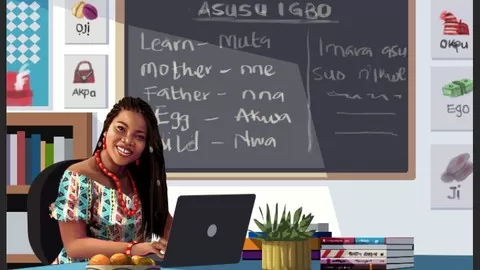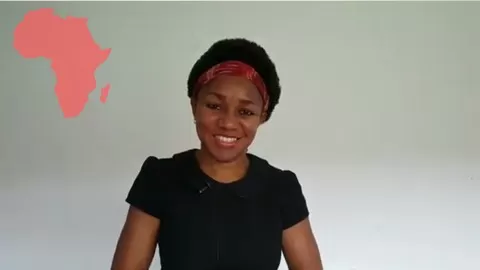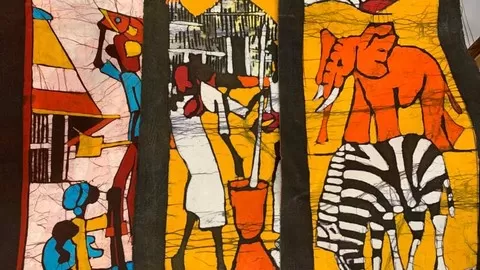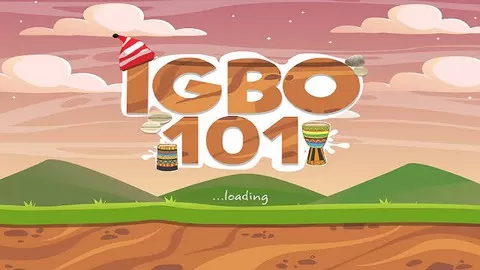Welcome to this unique approach to Igbo language instruction. In the next series of lessons, you will be introduced to the structure of the Igbo language. You will see the core position of the verb and how other expressions, vocabularies and parts of speech can combine with the verb to form sentences. This is a beginner course, but it will provide you with the basis and a good understanding of the structure of the Igbo verb, which you will need in the more advanced courses. With this foundation, you will soon find yourself speaking Igbo by combining various elements of the language as you go. All I ask for is that you follow the lessons the way I have arranged them and try to complete everything. I keep adding lessons to it and you will receive an email every time I upload a new lesson. I hope that you will take advantage of this unique and functional approach to Igbo language instruction to learn and speak Igbo.
Below is a general description of the contents of each of the video lessons.
LESSON 1: Igbo Alphabet and parts of the human body
In this lesson, you will learn the letters of the Igbo alphabet. You will see how the letters are written and hear how they are pronounced. The letters which are also phonetic sounds are used in words and expressions covering mostly parts of the human body.
LESSON 2: Subject Pronouns in Igbo language
In this lesson, you will be introduced to grammar and subject pronouns in Igbo language. A noun is any name you can think of, such as Chidi, book, Toronto, USA, market, etc. Pronouns are used to replace nouns and reduce the repetition of the nouns in sentences. You will begin to understand the structure of the Igbo language and learn the different forms of subject pronouns in Igbo so that you can begin to combine the expressions and start speaking by making your own sentences.
LESSON 3: How to use the verb “ibu (to be)” to say your profession
In this lesson, you will be introduced to verb conjugation in Igbo language. Conjugation means breaking down a verb and identifying the correct forms to use depending on the noun, pronoun and tense (present, future, past, etc.). You will learn how to conjugate the verb “ibu” (to be) in the present tense. You will learn a bunch of vocabularies and professions to be able to tell what you do for a living. You will begin to understand the structure of the Igbo language and learn how to combine the verb with the vocabularies to start speaking Igbo by making your own sentences.
LESSON 4: More about telling your profession
In this lesson, you will build on your knowledge of verb conjugation in the present tense in Igbo language. You will learn how to form certain questions to find out what people do for a living. You will learn how to answer the questions using the verb “ibu” and the list of professions you have already learned.
LESSON 5: Conjugation of the verbs “ibi” and “idi” in the present tense
In this lesson, you are going to learn how to use the verbs “ibi” (to live) and “idi” (to be/stay) in the present tense. You will learn the use of impersonal pronouns “A” and “E” in the first person’s singular and how to group verbs in the present tense based on those impersonal pronouns.
LESSON 6: Learn how to introduce yourself and your friends
In this lesson, you will read a conversation between two people. Through that dialogue, you will learn how to introduce yourself to people in Igbo language. You will learn how to form basic questions such as how are you? what is your name? where do you live? where are you from? what do you do? You will also learn how to answer such questions, describing yourself and giving people your name, where you come from, where you live, etc.
LESSON 7: Learn how to describe yourself, brother and sister
In this lesson, you will be introduced to writing short compositions about yourself, your brother and sister. You will learn how to tell people your name, where you live, where you come from, your nationality, and what you do for a living or your profession, in Igbo language. You will be able to speak about a third person and provide the same information about a brother or sister. You will learn a bunch of vocabularies such as friend, uncle, brother, sister and be able to describe them in the same way.
LESSON 8: Using the verb “iwu” to talk about yourself and others
In this lesson, you will learn how different words may be used in Igbo language depending on the dialect and what part of Igbo land people may come from. You will continue to see the verb “ibu” in the present tense. You will see how to use either “ibu” or “iwu”, depending on your dialect, and how to combine the verbs with professions to describe yourself and others by telling what they do.
LESSON 9: Learn vocabularies and how to greet various people – Part 1
In this lesson, you will learn different titles and salutations such as Mr., Mrs., Ms., etc. You will learn family relationships such as father, mother, brother, sister, auntie, uncle, neighbour, son, daughter, friend, boyfriend, girlfriend, etc. You will learn the different periods of the day such as morning, afternoon, evening and night. You will learn how to greet people during the different periods. You will learn how to say things such as good bye, see you tomorrow, see you soon, etc.
LESSON 10: Learn vocabularies and how to greet people in different situations – Part 2
It is important to know how to greet people or respond to various forms of greeting in various situations at various periods of the day, such as morning, afternoon, evening and night. In this lesson, you will learn more vocabularies relating to greeting. You will learn expressions to use when you meet people or are leaving them. You will learn a traveler’s song as well as proverbs relating to coming and going. You will learn how to begin speeches and public addresses in Igbo language.
LESSON 11: Learn vocabularies and how to greet people in different situations – Part 3
In this lesson, you will learn many new words, expressions and family/extended family relationships in Igbo language, such as brother, sister, kinsmen, union, meeting, community, etc. You will continue to learn about how to greet people in different situations and learn authentic ways to find out how people are doing in Igbo. You will also learn how to respond to questions and tell how you are.
LESSON 12: Learn to express your wants and wishes using the verb “icho”
In this lesson, you will understand the verb as the core of the Igbo language. You will learn conjugation of verbs in the simple present tense in Igbo. You will learn how to conjugate the verb “icho” (to want/look for). You will see the different forms and how they combine with subject pronouns. You will see the two different options in the first person’s singular.
LESSON 13: Learn to express what you want/are looking for/want to be, using “icho” and “ibu”
Verb conjugation is the process of breaking down a verb and using its different forms depending on the noun or pronoun as well as verb tenses such as present, future or past. In this lesson, you will continue to see the simple present tense in Igbo language. You will learn the different forms of the verb “icho” (to want/look for) in the present. You will learn how to form questions to find out what people want. You will learn new vocabularies, expressions and professions such as banker, student, black smith, pilot, doctor, etc. You will learn how to ask questions to find out what people want to become. You will see how to combine the verb “icho”, “ibu” and other parts of speech to tell what you want to become.
LESSON 14: Learn to express what you want/looking to have or do with “icho”, “inwe” and other verbs
In this lesson, you will learn more vocabularies, words and expressions. You will learn the names of certain everyday objects such as life, money, shoes, airplane, ship, house, etc. You will learn have to combine the vocabularies with the verbs “icho” (to want/look for) and “inwe” (to have). You will learn a bunch of other verbs such as to drink, to eat, to read, to play, to dance, to sleep, to watch, etc. You will learn how to construct questions to find out what people want to have or do. You will understand the structure of the Igbo language and will be able to start telling the various things you want to have or do.
LESSON 15: Learn to use to verb “icho” (to want/look for) in the progressive tense
In this lesson, you will learn new vocabularies, words and expressions relating to the things or places you may be looking for. You will be introduced to the progressive or present continuous tense in Igbo language. You will learn how to construct questions to find out what people are looking for. You will also learn how to respond to such questions to tell what you are looking for.
LESSON 16: Learn some Igbo proverbs using the verb “icho” (to want/look for)
In Igbo language, proverbs and idiomatic expressions are like “the palm oil with which words are eaten.” You cannot be considered a proficient Igbo speaker if you do not use the right proverbs in the appropriate situations. In this lesson, you will learn the importance of proverbs and adages in Igbo. You will learn a few proverbs relating to the verb “icho” (to want/look for) in Igbo language.
LESSON 17: Learn how to count from 1 to 50
In this lesson, you are introduced to counting in Igbo language. You will learn how to could from 0 to 50. Attention is focused on a simple counting technique whereby you understand a few numbers and see how they combine to achieve many other numbers.
LESSON 18: Learn how to read the clock and tell the time
In this lesson, you will learn vocabularies and expressions relating to the clock and time. You will learn the different periods of the day, such as morning, afternoon, evening and night. You will see how those expressions are combined with numbers to read the clock and tell the time in Igbo language. You will be able to practice and do those combinations by yourself.
LESSON 19: Learn to express your Christmas, Easter, New Year and other festival wishes
In this lesson, you will learn a bunch of common vocabularies and expressions around major festivals in Igbo language, such as Christmas, Easter, New Year, New Yam Festivals and more. You will be exposed to various ways of combining language elements and vocabularies so that you are able to express festival wishes to people you love, family and friends, during festival periods. You will be able to express your Christmas, Easter and New Year wishes in Igbo language.
LESSON 20: How to tell the languages you speak/understand
In this lesson, you are going to learn how to tell the languages you speak. You will learn how to conjugate the verb isu (to speak) and the verb inu (to hear/understand). You will see how to use these verbs to start forming your own sentences, telling the languages you speak/understand.
LESSON 21: Telling how many languages you speak
In this lesson, you will see how I introduce myself in a few sentences, telling how many languages I speak and listing those languages.
LESSON 22: How to find out the languages people speak
In this lesson, through the use of a dialogue, you will acquire more vocabularies relating to the use of languages. We learn how to form various questions to find out what languages/how many languages a person speaks. We learn how to answer those questions too, so that we are fully able to tell the languages we speak.
PROBLEM WITH THE COURSE?
Contact me on Udemy if you have any problem with this course.
Chidi Igwe
All you need to become proficient in the Igbo language
4.8
★★★★★ 4.8/5
320 students







